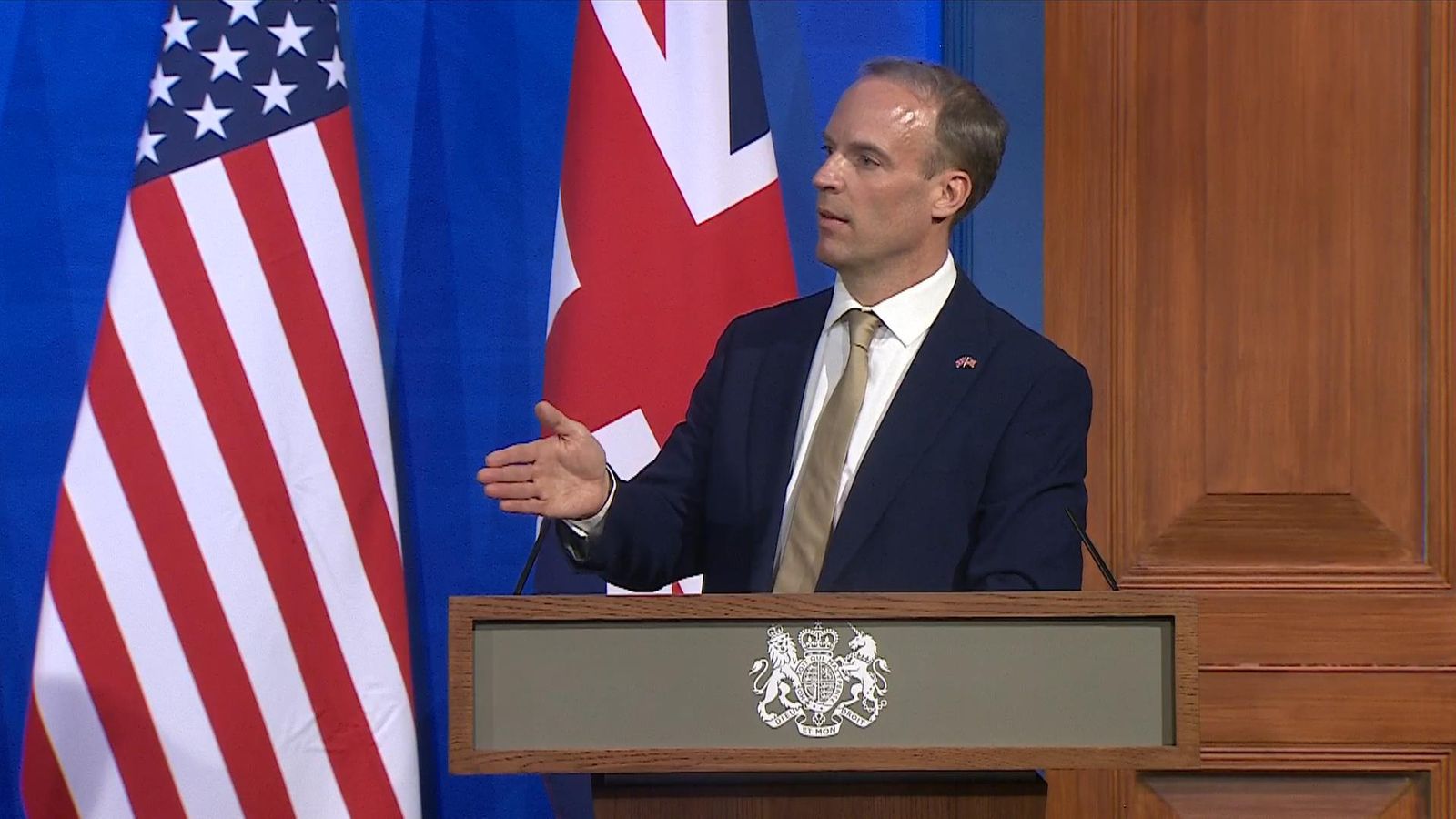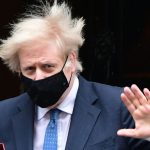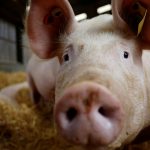Dominic Raab has said Russia’s behaviour “has got to change” in order to improve relations with the UK ahead of discussions between G7 foreign ministers.
The foreign secretary held a joint news conference with US Secretary of State Antony Blinken in Downing Street on Monday.
Among the topics discussed were sanctions on Russian citizens, climate change and President Joe Biden’s decision to withdraw US troops from Afghanistan later this year.
Mr Raab said there was an increasing demand for “likeminded countries” which shared the same values, such as the countries of the G7 and invited guests, to work together in the face of hostile states like Russia and China.
Ahead of the first G7 foreign ministers meeting in more than two years, Mr Raab said London and Washington stand “shoulder to shoulder” on a range of issues.
Mr Blinken said the US has “no closer ally, no closer partner” than the UK.
Russia
Asked by a journalist if there was any consideration for including Russia at G7 gatherings, even informally, Mr Raab said the door for good diplomatic relations is “always open”, but that the behaviour of Russia must change.
He said: “What’s got to change is Russia’s behaviour, as a P5 (permanent) member of the security council, against the basic norms of international law.
“Whether it’s the brinkmanship and the sabre-rattling on the border with Ukraine, whether it’s the cyber attacks and the misinformation or indeed the poisoning of Alexei Navalny which was not just a human rights abuse but the use of chemical weapons on Russian soil.
“So the opportunity for a better relationship with Russia is there, we would welcome it, but it depends on behaviour and deeds.”
Mr Blinken added that the US also wants a more stable relationship with Russia – but that will depend on how aggressively the Kremlin decides to act.
It comes ahead of a planned meeting between Russian leader Vladimir Putin and US President Joe Biden in the next month or so.
He said: “President Biden’s been very clear for a long time, including before he was president, that if Russia chooses to act recklessly or aggressively, we’ll respond.
“But we’re not looking to escalate: we would prefer to have a more stable, more predictable relationship. And if Russia
moves in that direction, so will we.”
China
Mr Blinken said the West was not trying to “contain” or “hold China down”.
“What we’re trying to do is to uphold the international rules-based order that our countries have invested so much in over so many decades,” he said.
“And when any country – China or otherwise – takes actions that challenge or undermine or seek to erode that rules-based order and not make good on the commitments that they’ve made to that order, we will stand up and defend the order.”
Mr Raab said: “I think it’s fair to say we see eye to eye on the need to stand up for our values, holding Beijing to the commitments that they’ve made, whether it’s in relation to Hong Kong under the joint declaration or wider commitments, whilst also at the same time finding constructive ways to work with China in a sensible and positive manner.”
He added: “I think on global issues like climate change, we want to see China stepping up to the plate and playing its full role.”
US-UK special relationship
Mr Blinken told the news conference that the US and UK’s special relationship is “close to the hearts of the American people”.
He said: “We’re connected. It’s often said but always important to reaffirm. We’re connected by ties of friendship, family, history, shared values, and shared sacrifice.
“We’ve been reminded of that again in recent weeks as we prepare to draw down our forces from Afghanistan.
“We’ve stood shoulder to shoulder for nearly 20 years, sharing a mission and having each others’ backs. We’ll never forget it.
“The United States has no closer ally, no closer partner, than the United Kingdom, and I’m very glad for the chance to say that again here today,” he continued.
He added that President Biden is “very much looking forward” to being in the UK for G7.
Aid cuts
On Sunday, Mr Raab insisted the cut to UK foreign aid spending was “necessary” due to the “seismic impact of the pandemic on the UK economy”.
During Monday’s press conference he said it had been a “difficult decision” but that the UK still has scope “to be an even greater force for good in the world”.
He said: “Even after the cuts that we’ve had to make because of the pressing COVID situation, the biggest contraction of our economy for 300 years, double the budget deficit we faced after the financial crash, we’re still putting £10bn in.
“As a proportion of GDP still the third biggest G7 donor. Doubling our international climate finance contribution, one of the biggest bilateral humanitarian donors, the biggest donor to GAVI.”
He added that while it’s been a “difficult decision” he believes it “shows the scope for us to be an even greater force for good in the world”.
Nazanin Zaghari-Ratcliffe
Mr Raab said reports from Iran that said Britain would pay a £400m debt to secure the release of Nazanin Zaghari-Ratcliffe are “not yet accurate”.
The aid worker has just been sentenced to another year in prison after finishing a five-year sentence in Iran.
“It’s incumbent on Iran unconditionally to release those who are held arbitrarily and, in our view, unlawfully, and the
reports, I’m afraid, are not yet accurate in terms of the suggestion of her imminent release,” he told the news conference.
Climate
Mr Raab praised Joe Biden’s administration on its “very welcome steps” on climate change which had created “momentum”.
He said: “I think it’s fair to say the Biden administration is barely 100 days old, but has already taken a huge number of bold and very welcome steps on issues like climate change, global health and human rights.
“And that’s really created momentum in efforts to tackle these pressing global issues.”
He also said “we must work with China” on global issues such as climate change.
Myanmar
Mr Raab said the UK government wants to see an “end to the violence” in Myanmar.
He said: “We want to see the military regime return to democracy and the electoral mandate that the government should have representing the people of Myanmar.”
He added that the UK would “keep up” efforts around diplomacy and sanctions to bring a “change for the better” in the country.
“We want to see an end to the violence, we want to see the military regime return to democracy and the electoral mandate that the government should have, representing the people of Myanmar,” he said.
“We’ve been clear, not just in our targeted sanctions, but our wider measures we are taking to stop UK businesses doing business with conglomerates or businesses controlled by the Tatmadaw [Myanmar armed forces], that we are going to apply pressure that way.”
Mr Blinken said it is “vital” that violence in the country ceases and that prisoners be released so that Myanmar can “return to the path of democracy”.
Afghanistan
The withdrawal of troops from Afghanistan also featured in the discussion, with Mr Raab saying the UK had received “good consultation” from the US on its decision to remove troops from the country – a process that began over the weekend.
He said: “On Afghanistan, just to be clear from a UK perspective, we do not feel ignored by US partners.
“We have had very good consultation on this and we continued that, we discussed it today.”
He continued: “We certainly see the priority is protecting our troops in the period between now and September, making sure that we preserve the ability to deal with counter-terrorism, the gains that were hard-won in Afghanistan are not lost.
“And also ultimately promoting dialogue and a peace process that benefits all Afghans and leaves Afghanistan as stable as possible, as inclusive as possible.”
Mr Blinken added: “As we worked toward the decision that President Biden made, we spent a good deal of time very actively consulting with our NATO partners and NATO allies.”






















